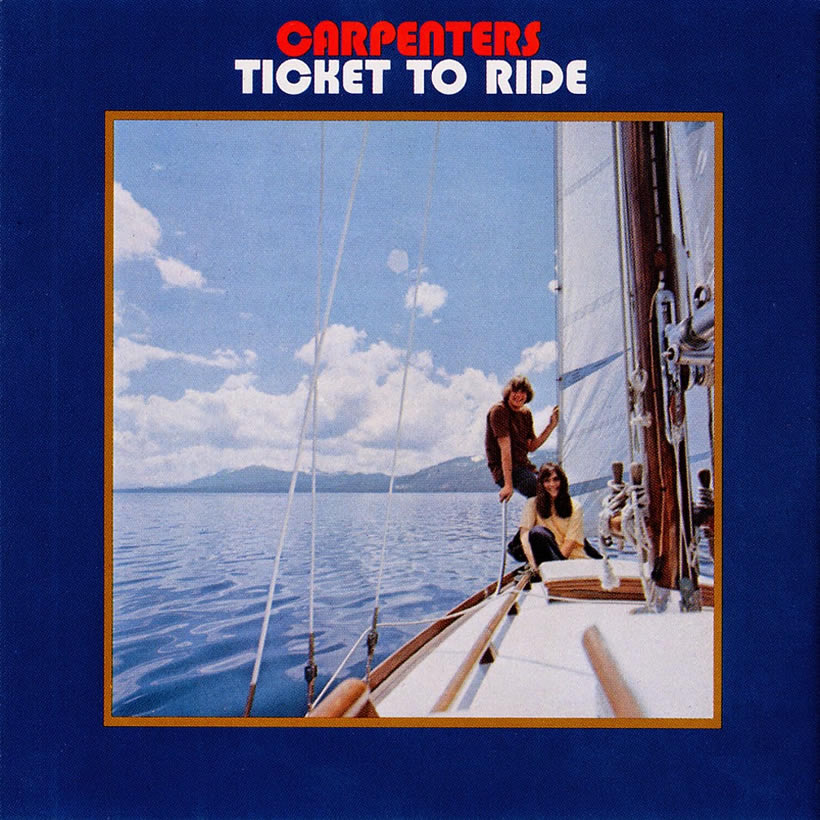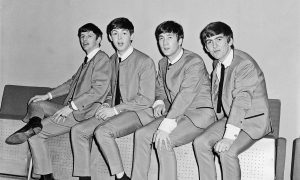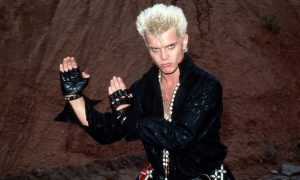Name another band that has released a cover of a Beatles classic as their debut 45. It’s audacious, and shows the kind of musical confidence that Richard and Karen Carpenter had from the very start. Richard was 23, and Karen was still a teenager at 19 years old when “Ticket to Ride” was released as Carpenters‘ first A&M single. But the truth is that the album that we all think of as the Carpenters’ debut had been released in later 1969 under a different name; it was only changed in the wake of the moderate success of their 45.
Listen to Ticket To Ride right now.
It was on Valentine’s Day 1970 that Carpenters’ “Ticket to Ride” entered the Billboard Hot 100; five weeks later it got as high as No. 54, before beginning its slow descent and eventual exit from the bestseller list. Six months earlier, A&M Records had issued the duo’s debut album, Offering, from which “Ticket to Ride” was taken.
Offering failed to make the bestseller list, but would eventually make the Billboard album chart in the week of March 6, 1971, when, following the massive success of Carpenters and their Close to You album, A&M renamed the earlier release as Ticket To Ride, put it out with a new cover, and gave it a new lease of life. It remains the least well-known of their albums, and certainly one of the most underrated.
The album opens with a trademark Richard and Karen a cappella vocal, with exquisite harmonies; as an album opener “Invocation,” barely a minute long, has a maturity way beyond what a new group would normally attempt. It’s followed by the upbeat “Your Wonderful Parade,” with Richard on lead vocals and Karen handling backing vocals and harmonies. This album, unlike most Carpenters releases, has the siblings sharing lead vocals; later Karen would normally take on the job.
Richard and John Bettis, who had originally been in a band called Spectrum that featured Carpenters, wrote “Your Wonderful Parade” and seven other tracks on the album, including the beautiful ballad, “Someday” which is up next. It is another track that belies the youth and relative inexperience of the siblings. Imagine that you had bought this album in October 1969 and got to the third track and heard Karen’s lead vocals for the first time. You would have been blown away.
A cover of the Youngbloods hit “Get Together” is next and that’s followed by another Karen ballad, Richard’s solo composition “All of My Life.” Side one of the original album ends with Richard singing “Turn Away.”
Side two opens with their hit single, a very singular cover of this Lennon and McCartney classic that Carpenters make their own. Richard’s “Don’t Be Afraid” is a slice of whimsy, but there’s no harm in whimsy when it is so well arranged and with a great chorus to boot. “What’s The Use” is another lead vocal from Richard and “All I Can Do” with its jazz vibe and Karen’s excellent vocal is like nothing else Carpenters ever recorded. That’s just one more thing in the favor of this album: they were unafraid to experiment and try things with the enthusiasm of (relative) youth.
“Eve” is just one more gorgeous Karen lead vocal that is a signpost to the future sound of Carpenters. Buffalo Springfield was one of the West Coast’s most creative bands and Richard’s lead vocal on Neil Young’s “Nowadays Clancy Can’t Even Sing” is good, but it is the harmonies that turn this from the ordinary to something very special. When Karen intones “sings” in the choruses along with Richard’s electric piano, it is little short of magical. To end, there’s another a cappella vocal on “Benediction” that perfectly completes one of the most assured debut albums by any major artist – even if the public didn’t immediately catch on to its magic.
Aside from Richard and Karen, there are virtually no other musicians on Ticket To Ride. It only goes to underscore what a fabulous album it is.
Listen to the Carpenters Best Of on Apple Music and Spotify.




